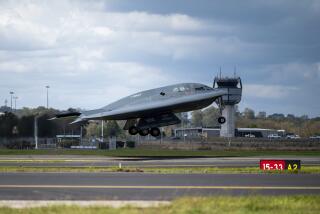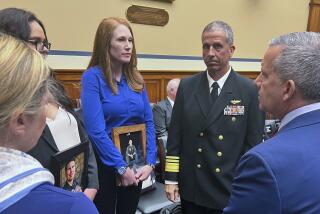Rep. Aspin Seeks Halt to Additional B-2 Funds : Bomber: The House Armed Services panel chief said he hopes to end the program when the 15 Stealth planes under construction are built.
- Share via
WASHINGTON — The controversial B-2 bomber suffered another major setback Monday as House Armed Services Committee Chairman Les Aspin (D-Wis.) formally joined the growing list of congressional opponents of the costly warplane.
In a floor speech, Aspin said that he can discern no “unique and compelling mission for the B-2” and declared that he hopes to terminate the program when the 15 bombers now under construction are completed.
Aspin’s change of heart--he helped keep the program alive last year--probably means that the plane will be voted down by the full House, leaving its future to be determined this fall when conflicting House and Senate versions of the bill are resolved by a House-Senate conference committee.
The Senate earlier this month approved the Administration request to spend $4.7 billion in the fiscal year beginning Oct. 1 to produce two B-2s and continue advanced development work on the plane.
The craft is being built by the Northrop Corp. at plants in Palmdale and Pico Rivera. Northrop employs 12,000 workers on the B-2 project; another 30,000 B-2 workers are employed by subcontractors, company officials said.
A Northrop official noted Monday that the Senate Armed Services Committee had supported full financing for the Stealth program and said that the fight over the airplane is far from over.
“The debate on the B-2 really gets down to the future and the question of whether this country is going to have a manned bomber, or only ballistic missiles,” said Tony Cantafio, a Northrop spokesman. “I don’t think that’s what Americans want,” he said.
Senate Armed Services Committee Chairman Sam Nunn (D-Ga.), Congress’ most influential voice on defense affairs, has supported the Administration plan to buy 75 Stealth bombers.
However, many in the Senate who have supported the plane are now said to be wavering. “It wouldn’t surprise me if it didn’t survive in the Senate,” a key Democratic Senate aide said. “Without strong White House involvement, its future is pretty dim.”
Nunn conceded Monday that Aspin’s decision “will make the fight to preserve the B-2 an uphill battle,” but urged lawmakers to “maintain the option for additional production until we see the results of the critical testing of the B-2” later this year.
However, he added, he does not believe the B-2 can be preserved “unless the President, the secretary of defense, the Joint Chiefs of Staff and our arms control negotiators all argue forcefully for the program.”
Even supporters of the $840-million-a-copy bomber said that without a strong push from the White House the program is doomed.
During his floor speech Monday, Aspin complained that the Pentagon is pushing five expensive aircraft programs that would cost a total of $300 billion at a time when the federal budget deficit is exploding and other military spending is shrinking.
“Clearly, we’re not going to be able to afford all of these programs,” Aspin said. “We’ve got to cut back some of them. Terminating the B-2 may be but the first step in moving toward fiscal reality.”
Under the Aspin plan, the truncated B-2 program would cost $35.4 billion--for 15 planes--down sharply from the Administration’s proposal, which would build 75 of the radar-evading bombers at a total cost of $63 billion.
Air Force officials repeated their long-standing position that the B-2 is critical to maintaining America’s ability to drop nuclear or conventional bombs on a variety of targets around the world.
“It’s our lead element in the President’s strategic modernization program,” Air Force Chief of Staff Gen. Michael J. Dugan said in a television interview over the weekend.
Rep. Ike Skelton (D-Mo.), spokesman for the B-2’s proponents in the House, berated the White House on Monday for delaying while support for the warplane has evaporated.
Skelton said that his first contact from the White House on the B-2 was last Friday, when National Security Adviser Brent Scowcroft called to ask that he set up meetings with key House members to discuss the troubled warplane.
“I told him they were coming in late,” Skelton said at a press conference Monday. “They should have done this a month ago.”
The Missouri Democrat defended the new plane as necessary, both as a military deterrent and to preserve American technological superiority. “This Buck Rogers-type technology is very important to the United States,” he said.
Rep. John R. Kasich (R-Ohio), one of the original House sponsors of legislation to kill the bomber, contended that the aircraft poses a tough political dilemma for GOP lawmakers.
“It’s going to be very hard for Republicans, who are resisting (President Bush’s switch on his) no-new-taxes pledge to vote against taxes and then spend money to buy a $1-billion airplane,” Kasich said at a press conference Monday.
Kasich also declared that opponents of the B-2 now have the momentum behind them. “Our cost arguments are borne out, our mission arguments are borne out,” he said. Ending production of the B-2 “is a way to reap a big dividend” from the end of the Cold War.
Kasich said that Aspin’s decision “sets up a battle of titans between Nunn and Aspin as to who shapes defense policy in the ‘90s and thereafter.
“I think (B-2 supporters) are on very thin ice,” he said. “I can’t predict we’ll win all the way through conference (committee), but it’ll be a very big battle.”
Nunn, who until now has strongly backed the controversial bomber, is said to be waiting for a signal from the White House on the Administration’s military and budgetary priorities.
A close Nunn aide said that the Air Force’s credibility has been tarnished by continuing problems with a variety of expensive aircraft programs and by constantly rising price estimates for the B-2. He said that only Bush can save the B-2.
“If the White House gets involved in the debate and indicates their priorities and strongly supports the B-2, that will help in the Senate,” the Nunn aide said. “But if they sit on their hands, it may just go down.”
More to Read
Sign up for Essential California
The most important California stories and recommendations in your inbox every morning.
You may occasionally receive promotional content from the Los Angeles Times.










